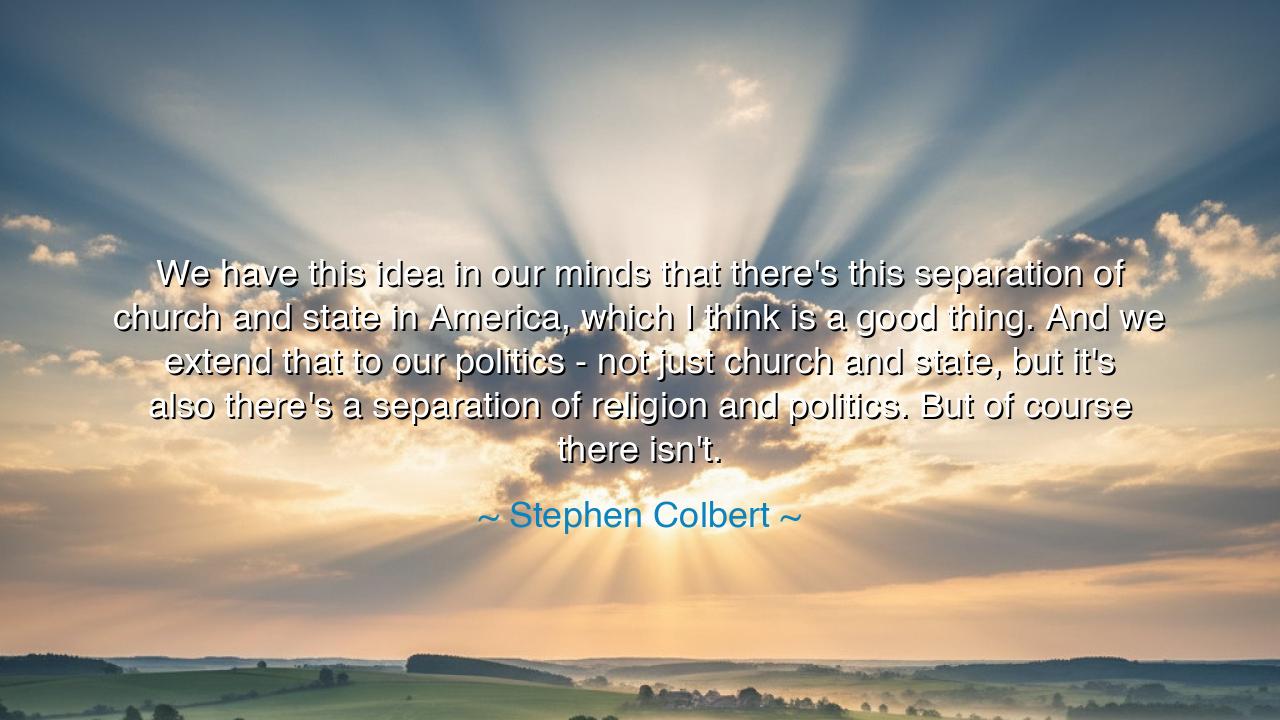
We have this idea in our minds that there's this separation of
We have this idea in our minds that there's this separation of church and state in America, which I think is a good thing. And we extend that to our politics - not just church and state, but it's also there's a separation of religion and politics. But of course there isn't.






Hear, O seeker of wisdom, the words of Stephen Colbert, sharp as an arrow yet cloaked in humor: “We have this idea in our minds that there's this separation of church and state in America, which I think is a good thing. And we extend that to our politics—not just church and state, but it's also there's a separation of religion and politics. But of course there isn't.” In this saying lies a truth uncomfortable and undeniable. It speaks of an ideal cherished in principle yet often betrayed in practice: that religion and politics might be cleanly divided, as if the soul of a people could be neatly severed from the laws by which they are governed.
Consider first the idea of separation. When America was born, its founders, weary of kings and priests joined in tyranny, sought to protect conscience from the heavy hand of the state. They declared that no single creed should rule the land, that freedom of belief must be the right of all. This was wisdom, a shield against oppression, a safeguard for diversity. Yet Colbert reminds us that while this separation is written on paper, it is not so easily lived. For religion is not merely ritual but the shaping of values, and values are the very bones of politics.
Behold history’s witness. In the days of the Civil Rights Movement, it was the pulpit as much as the podium that stirred the conscience of the nation. Martin Luther King Jr., a preacher of the Gospel, drew upon scripture and faith to demand justice for the oppressed. His words, thundered from church steps, shook the halls of Congress. Here, religion and politics were not separate but entwined, faith fueling the struggle for equality. Thus Colbert’s observation proves true: there is no wall between belief and governance, for the heart of man carries both wherever it goes.
So too, in darker chapters, religion has been wielded as a tool of political power, justifying wars, slavery, and exclusion. Leaders have cloaked ambition in piety, stirring crowds with sacred language to sanctify their causes. This fusion has often brought not liberty but oppression, proving that when politics borrows too heavily from religion—or when religion seeks to dominate politics—both can be corrupted. Colbert’s words remind us to be vigilant, to recognize that the two cannot be separated absolutely, but must be balanced with wisdom.
The meaning, then, is clear: religion and politics are bound by the human heart. For every citizen brings to the public square the weight of their conscience, their sacred beliefs, or their lack thereof. To deny this is folly. To pretend the two are wholly separate is illusion. The challenge is not to erase religion from politics, nor to allow it to rule unchecked, but to navigate their entanglement with humility, justice, and respect for all.
The lesson for us is this: guard both freedom of belief and fairness of law. Recognize that religion will always shape politics because it shapes people, but resist the urge to make one creed the law of all. Defend the rights of your neighbor’s faith even as you hold fast to your own, for in this balance lies the strength of a free society. As Colbert shows us with humor and wit, the myth of pure separation is broken—but the dream of fairness and liberty endures if we hold it with vigilance.
Practical counsel follows. When you engage in political debate, speak from your values, but do not demand that others bow to your creed. When you hear leaders use religion to divide, question their motives and seek the deeper truth. Study history, that you may see how often religion and politics have joined hands for both justice and injustice. And in your own life, practice the art of balancing faith and fairness, so that you may live as both a citizen of heaven and of earth.
Therefore, O child of tomorrow, remember Colbert’s wisdom: the separation of church and state may be law, but the separation of religion and politics is illusion. Walk with eyes open to this truth. Guard against tyranny, but also honor the power of faith to inspire justice. For the heart that denies this entanglement is blind, but the heart that sees it clearly may yet guide society toward harmony, where freedom of conscience and fairness of rule live together as companions, not foes.






AAdministratorAdministrator
Welcome, honored guests. Please leave a comment, we will respond soon